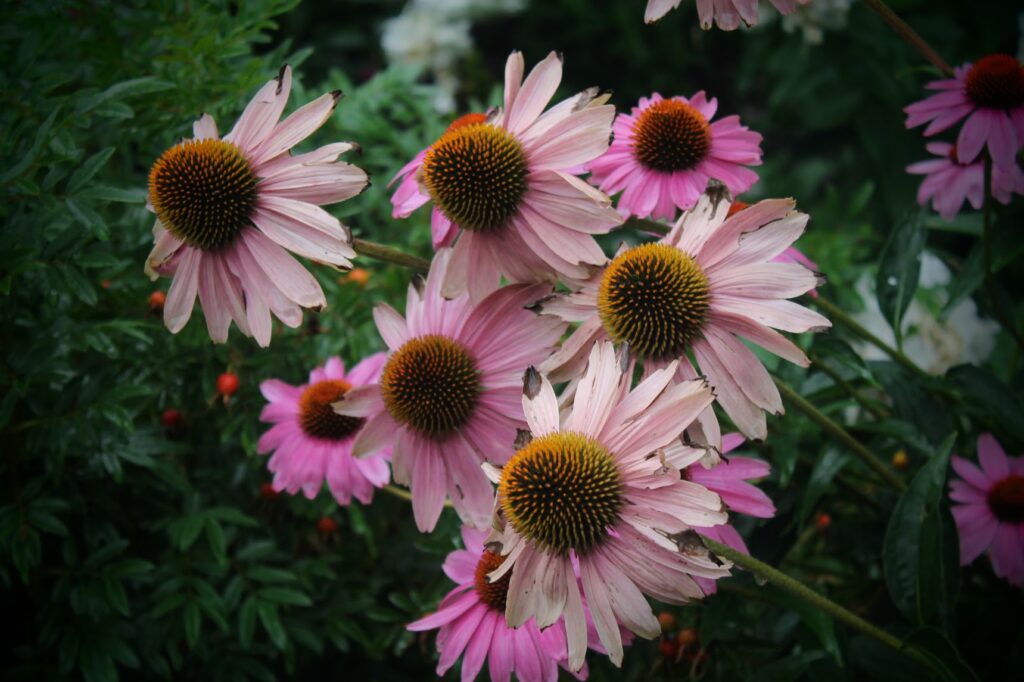
Two years after the first emergence of SARS-CoV-2, various new waves of COVID-19 have swept across Europe. This has been driven by new variants due to the lifting of restrictions and increased social mixing, which will likely further increase in the autumn and winter months as schools reopen and people return from vacation. This could again place a huge burden on healthcare systems throughout the world, which are already under enormous pressure from dealing with the previous COVID-19 waves.
Our researchers have been searching for ways to lower this COVID-19 burden on healthcare systems. Prof. Wim Vanden Berghe’s lab (Proteinchemistry, Proteomics and Epigenetic Signalling – PPES) has been testing whether the medicinal plant extract Echinacea purpurea can be used to treat Coronavirus infections. Echinacea purpurea contains potent antiviral substances that broadly inactivate respiratory pathogens, including Coronaviruses 1, 2.
Under laboratory conditions, Prof. Wim Vanden Berghe’s lab found that Echinacea purpurea phytochemicals strengthen the antiviral innate immunity by supporting interferon defense responses. Interferons, the body’s first line of antiviral defence, are cytokines that are secreted by host cells in response to virus infection. By inducing the expression of hundreds of interferon-stimulated genes, several of which have antiviral functions, interferons block virus replication at many levels. “Essentially, Echinacea purpurea extracts train antiviral chemokine gene expression and epigenetic DNA-methylation silencing of endogenous retroviral sequences” explains Prof. Wim Vanden Berghe 3, 4. This could explain how Echinacea helps to strengthen the immune system and fend off respiratory infections.

But would Echinacea purpurea also work in humans? In a first randomized, double-blind, placebo-controlled study, 755 adults took Echinacea purpurea (Echinaforce® extract) for 4 months. There was a 37% reduction in the incidence of endemic Coronavirus infections. Enveloped viruses, a group of pathogens that comprise Coronaviruses, were even reduced by 51%.
Another prevention trial administered the same Echinacea extract to children 4 to 12 years of age. Those receiving Echinacea had significantly milder symptoms (64.2% reduction) when experiencing Coronavirus infections. Most importantly, Echinacea significantly reduced viral loads by 98.5% in nasopharyngeal secretions, the ultimate indicator for antiviral effects. Similarly to the study in adults, the risk for infection of enveloped viruses was strongly reduced by 57%.
Finally, the very latest clinical study in humans was carried out by Prof. Wim Vanden Berghe’s lab, together with an international consortium of researchers from the UK, Germany, Italy, Bulgaria, Slovenia and Belgium to explore if Echinacea could be used to prevent SARS-CoV-2 infections.
In this study, 120 adults were randomized to either take Echinacea purpurea over 5 months or to a non-treatment group. Nasopharyngeal and blood samples were collected to measure the presence and concentration of respiratory viruses, including SARS-CoV-2. In the Echinacea group 63% fewer SARS-CoV-2 infections were detected. Echinacea was also found to significantly reduce overall viral loads during acute illnesses by over 99%.
“The results from this human Echinacea trial are very promising and the samples collected from this study could now be used to determine how exactly Echinacea supports our immune system”. – Prof. Wim Vanden Berghe
Two years after the first emergence of SARS-CoV-2, this epidemic is still not fully under control and continuous virus variants seem to counteract effective containment. Could Echinacea become an additional force against Coronavirus infections?
Yes, the data looks very promising! According to these preliminary human studies, Echinacea purpurea supports broad antiviral effects against enveloped viruses, including Coronaviruses. Taking Echinacea was found to be safe and seems to prevent viral illnesses, so the overall risk-benefit balance appears to be positive. However, more human studies are needed, especially for SARS-CoV-2, as the number of clinically proven SARS-CoV-2 infections reported in the clinical Echinacea studies was small.
Questions or press inquiries? Contact Prof. Wim Vanden Berghe: wim.vandenberghe@uantwerpen.be
Article written by Prof. Wim Vanden Berghe. Edited by Dr. Bronwen Martin.
